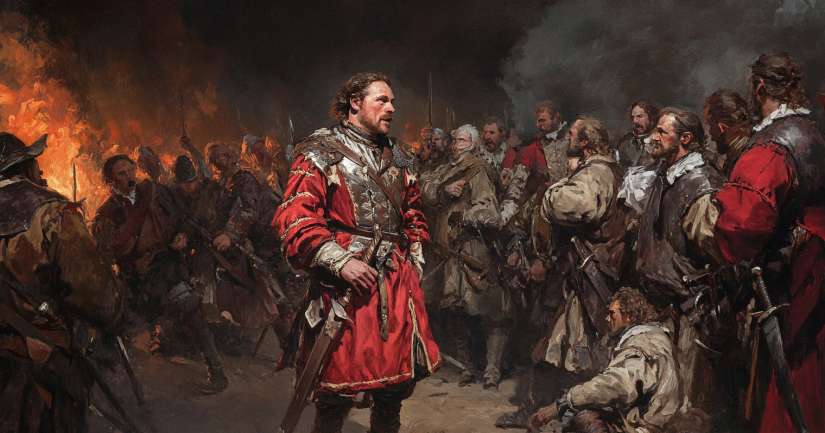
Tragedy strikes as Henry learns of French war crimes in Henry V Act 4 Scene 6 Quiz—do you remember his response? Henry V Act 4 Scene 6 Quiz fans, prepare to explore one of the most intense moments in the Battle of Agincourt. This scene highlights the brutality of war, Henry’s strategic decisiveness, and the contrast between honor and necessity. Shakespeare presents Henry as both a noble warrior and a pragmatic ruler, showing how the weight of leadership forces him to make harsh decisions on the battlefield.
As the battle rages on, Henry surveys the battlefield, realizing that despite their earlier success, the English army is still in danger. The Duke of York, one of Henry’s noble commanders, has been killed in combat, alongside the brave Earl of Suffolk. Their deaths serve as a sobering reminder that even noble warriors fall in war.
Victory is within reach, but Henry’s troubles are not over yet. See how the battle progresses in Henry V Act 4 Scene 7 Quiz. Want to look back at the French defeat unfolding? Check out Henry V Act 4 Scene 5 Quiz. And for a broader test of your Shakespearean knowledge, take on the Henry V Shakespeare Quiz!
Enter the Henry V Act 4 Scene 6 Quiz Now
Henry V Shakespeare Quizzes: Think you know Shakespeare’s legendary king?
Summary of Henry V Act 4 Scene 6
Henry, seeing that French reinforcements may be coming, makes a ruthless yet strategic decision—he orders that all French prisoners be executed. This moment marks a significant shift in Henry’s leadership, proving that he is not just a charismatic ruler, but also a cold strategist when necessary.
As the scene ends, the English forces brace for the final phase of the battle, knowing that victory is near but that the cost of war remains high.
Key Themes in Henry V Act 4 Scene 6
Shakespeare explores the balance between honor and survival. Henry is often portrayed as a just and noble king, but here, he makes a ruthless choice that prioritizes strategy over mercy. His decision to execute the prisoners may seem harsh, but it reflects the brutal reality of medieval warfare.
Another major theme is the unpredictability of war. Even with the English in a winning position, the battle remains dangerous, and Henry must stay ahead of his enemies to secure victory. Shakespeare reminds the audience that war is never truly won until the final blow is struck.
Shakespeare’s Use of Language and Contrast
- The solemn report of York and Suffolk’s deaths provides a moment of reflection before Henry’s brutal command.
- Henry’s short, decisive order to kill the prisoners contrasts with his earlier, more inspiring speeches, emphasizing his ability to switch from motivator to military leader.
- The lack of lengthy debate over the execution order reinforces its necessity rather than its morality, leaving the audience to judge Henry’s actions for themselves.
The Historical Context of Act 4 Scene 6
The execution of French prisoners at Agincourt is one of the most controversial moments in history. Henry’s decision was likely based on a real strategic necessity—with the English army vastly outnumbered, holding prisoners posed a security risk. However, some historical accounts suggest that not all prisoners were executed, as Shakespeare presents in the play. Regardless, this moment reinforces Henry’s image as both a brilliant leader and a ruthless tactician.
Are You Ready for the Henry V Act 4 Scene 6 Quiz?
Think you understand why Henry orders the execution, how the deaths of York and Suffolk affect the scene, and how Shakespeare portrays the realities of war? Do you remember why Henry believes this decision is necessary?
This Henry V Act 4 Scene 6 Quiz will test your knowledge of Shakespeare’s themes of war, leadership, and tough decisions. Take the quiz now and analyze the fine line between honor and necessity on the battlefield!
What Happened – Henry V Act 4 Scene 6
The scene takes place on the battlefield. King Henry V enters with his brother, the Duke of Gloucester. Henry asks about the Duke of York. Exeter, Henry’s uncle, reports that York has died. Exeter describes how York and Suffolk died together. They fought bravely and were injured. York saw Suffolk dying and went to help him. York then died beside Suffolk. He looks around and sees many dead soldiers.
Henry learns that the French have regrouped. They are attacking the English camp. The French want to kill the English boys who guard the camp. Henry is angry about this. He orders his men to kill all the French prisoners. This is to stop the French from attacking again. Henry wants to protect his men.
Montjoy, a French herald, arrives. He asks Henry for permission to gather the French dead. Montjoy admits that France has lost the battle. Henry agrees to let the French collect their dead. Montjoy acknowledges Henry’s victory. Henry asks if the battle is over. Montjoy confirms it is. Henry is relieved and He gives thanks for the victory.
The scene ends with Henry and his men preparing to leave the battlefield. They plan to return to their camp.
Henry V Act 4 Scene 6 – Quotes
- “Once more unto the breach, dear friends, once more.” – Henry, rallying his troops to attack the French again.
- “The king himself has followed his friend.”. Exeter, reporting the death of York and Suffolk’s brave sacrifice in battle alongside their king.
- “We few, we happy few, we band of brothers.”. Henry, inspiring his men with a sense of unity and shared purpose before the battle.
- “I was not angry since I came to France until this instant.”. Henry, expressing his anger and determination after seeing the losses on the battlefield.
- “Every subject’s duty is the king’s; but every subject’s soul is his own.” – Henry, acknowledging the personal responsibility and moral autonomy of each man despite their duty to the king.
